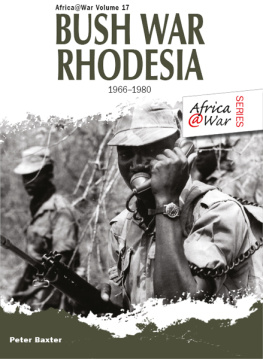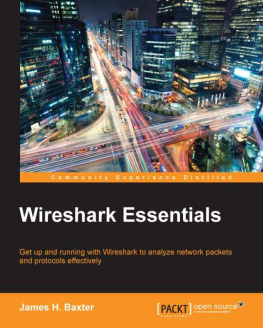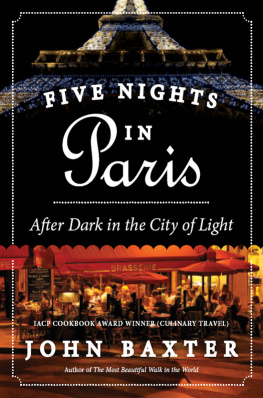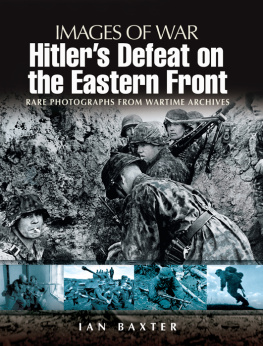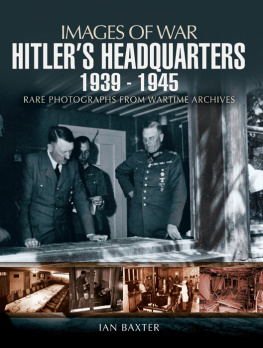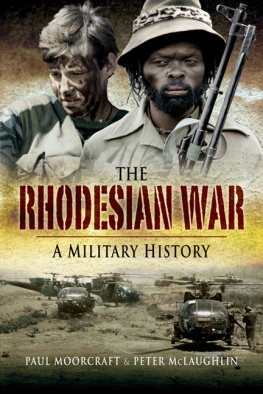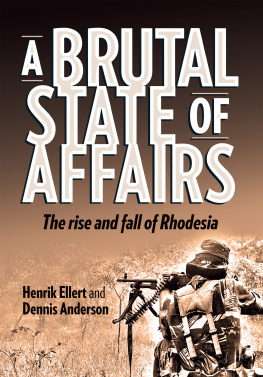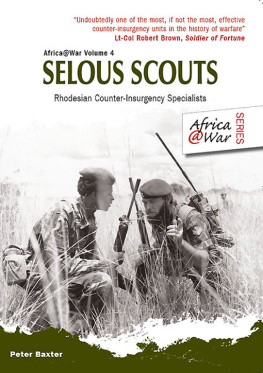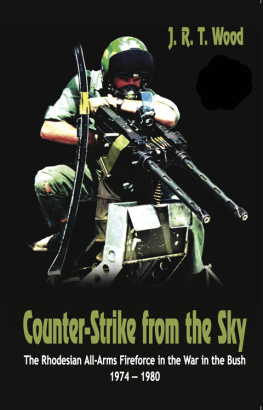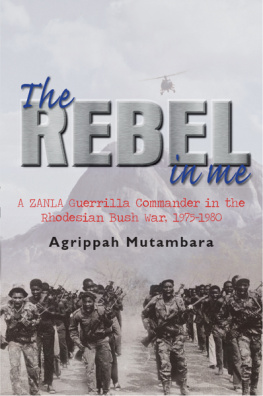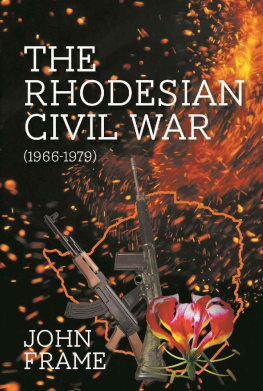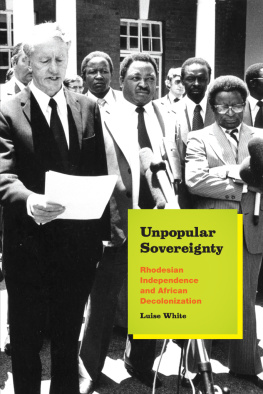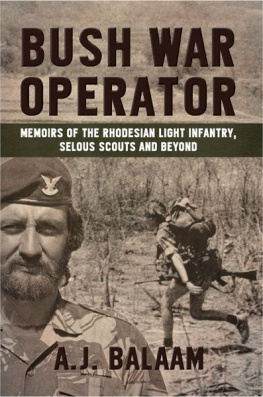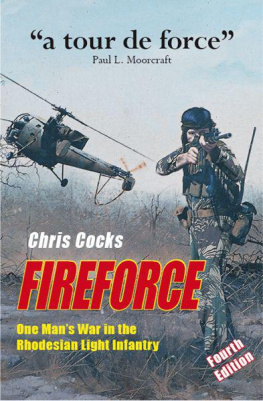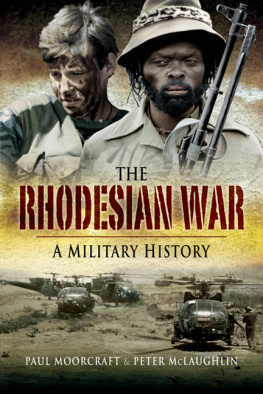Also by Peter Baxter:
Rhodesia: Last Outpost of the British Empire
France in Centrafrique: From Bokassa and Operation Barracuda to the days of the EUFOR
Selous Scouts: Rhodesian Counter-Insurgency Specialists
SAAFs Border War: The South African Air Force in Combat 19661989
Mau Mau: Kenyan Emergency, 195260
Somalia: US Intervention, 19921994
Rhodesia Regiment, 18991981
Published in 2014 by:
Helion & Company Limited
26 Willow Road
Solihull
West Midlands
B91 1UE
England
Tel. 0121 705 3393
Fax 0121 711 4075
email:
website: www.helion.co.uk
and
30 South Publishers (Pty) Ltd.
16 Ivy Road
Pinetown 3610
South Africa
email:
website: www.30degreessouth.co.za
Copyright Peter Baxter, 2014
Designed & typeset by SA Publishing Services ()
Cover design by Kerrin Cocks
Printed and bound for Helion & Co by Henry Ling Ltd., Dorchester, Dorset and for 30 South Publishers by Pinetown Printers, Durban, South Africa
ISBN: 978-1-909982-37-6
DIGITAL ISBN: 978-1-910294-86-4
British Library Cataloguing-in-Publication Data
A catalogue record for this book is available from the British Library
All rights reserved. No part of this publication may be reproduced, stored, manipulated in any retrieval system, or transmitted in any mechanical, electronic form or by any other means, without the prior written authority of the publishers, except for short extracts in media reviews. Any person who engages in any unauthorized activity in relation to this publication shall be liable to criminal prosecution and claims for civil and criminal damages.
Front cover: A stick commander reports back to his HQ. Photo Rhodesian African Rifles Regimental Association (UK)
CONTENTS
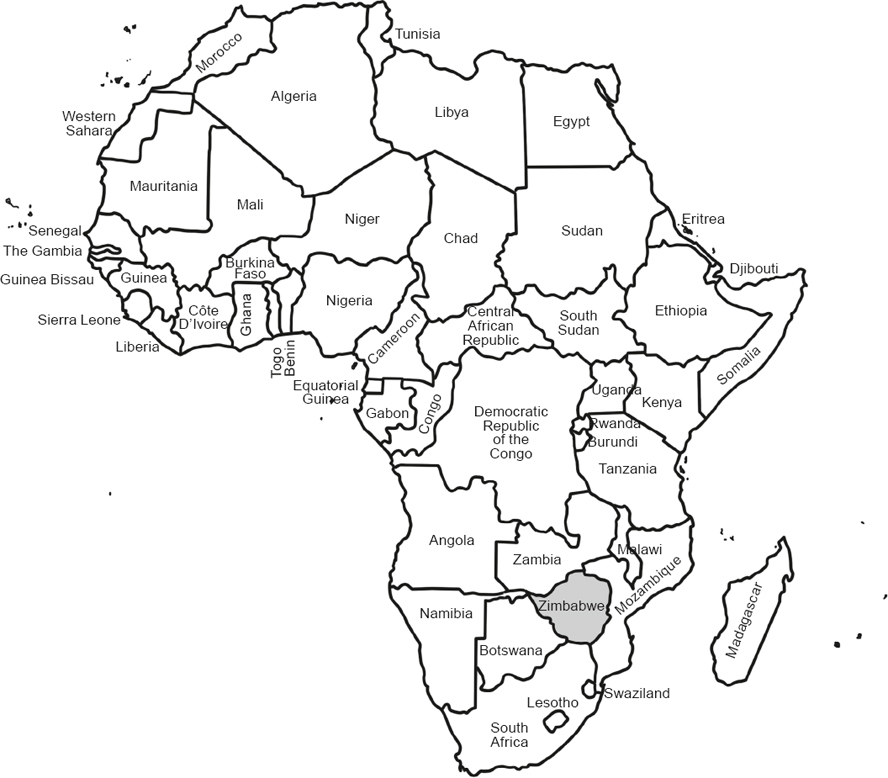
GLOSSARY
ANFO | ammonium nitrate and fuel oil explosive mixture |
BSAP | British South Africa Police |
ComOps | Combined Operations Headquarters |
CT | Communist terrorist |
FAF | forward airfield |
FN | Fabrique Nationale, Belgian arms manufacturer |
FPLM | Foras Populares para o Libertao de Moambique |
Frantan | frangible tank napalm bomb |
Frelimo | Frente de Libertaao de Moambique |
G-Car | Alouette III helicopter troop-carrier |
Golf bomb | 460kg Rhodesian-made pressure bomb |
gomo | hill (Chishona) |
JOC | Joint Operations Centre |
K-Car | Alouette III helicopter gunship |
MAG | Mitrailleuse dAppui General, 7.62 x 51mm general-purpose machine gun |
MID | Military Intelligence Directorate |
Mini-Golf | small version of the Golf bomb |
NCO | non-commissioned officer |
PATU | Police Anti-Terrorist Unit |
ter / terr | terrorist (slang) |
RAF | Royal Air Force |
RAR | Rhodesian African Rifles |
RhAF | Rhodesian Air Force |
RIC | Rhodesian Intelligence Corps |
RLI | Rhodesian Light Infantry |
RR | Rhodesia Regiment |
RRAF | Royal Rhodesian Air Force |
RRR | Royal Rhodesia Regiment |
SAS | Special Air Service |
SB | Special Branch |
TTL | Tribal Trust Land |
UANC | United African National Council |
ZANLA | Zimbabwe African National Liberation Army |
ZANU | Zimbabwe African National Union |
ZAPU | Zimbabwe African Peoples Union |
ZIPRA | Zimbabwe Peoples Liberation Army |
INTRODUCTION
On 13 September 1890, 500 men of the British South Africa Company Police stood to attention as Lieutenant Edward C. Tyndale-Biscoe ran the Union Jack up a makeshift flagpole dug into the soft earth of Mashonaland. As the ranks saluted, the first volley of a twenty-one gun salute rang across an empty landscape, and thus the birth of the British colony of Rhodesia was proclaimed.
With this display of military order complete, the men of the BSACo Police, and its associated pioneer corpsa corps delite, according to Rhodesian historian Sir Hugh Marshall-Hole, of farmers, artisans, miners, doctors, lawyers, engineers, builders, bakers, soldiers, sailors, cadets of good family with no particular occupation, cricketers, three parsons and a Jesuitbroke ranks, and for the first time since the start of the occupation, stood back to ponder the wide open country over which they now claimed control.
The British South Africa Company Pioneer Column was in fact a heavily armed, well-provisioned and independent occupation force that for several months had been probing northward from British Bechuanaland, through what would today be the southeastern lowveld of Zimbabwe, bristling with defensive capability against the not insignificant threat of attack by a shadowing force of a known 2,000 amaNdebele warriors. The entire enterprise had been extremely risky, but that risk had been obviated in part by a 10,000-candle-power searchlight that so awed the watching amaNdebele as it illuminated the surrounding bush that an attack was never ordered. A second, and probably more authentic reason was that the amaNdebele commander-in-chief, King Lobengula, in recognition of the fact that British power had so comprehensively obliterated the Zulu nation a decade earlier, and could likewise crush the amaNdebele with similar, refused to give the order.
The Pioneer Column was a private enterprise, funded and staged by the British South Africa Company in furtherance of the imperial goals of its founder, Cecil John Rhodes, but although unofficial in this sense, there can be no doubt that the British would indeed have intervened with a large imperial force had Lobengula been so ill advised as to order an attack against the advancing agents of British imperialism.
Imperial intervention, of course, would have achieved Cecil John Rhodess wider objective of British control of the central plateau of Mashonaland, and eventually of Matabeleland itself, but the net result would also have been imperial control of the territory, and not British South Africa Company control. It was essential for Rhodes to complete the occupation of Mashonaland without imperial help in order that his claim to the territory and its resources be uncomplicated by any opposing imperial claims. This was essential to keep the territory in private hands in order to satisfy the fiduciary expectations of a number of influential private investors who had supported Rhodes in this enterprise.
In the event, however, matters went precisely as planned. The Pioneer Column passed safely through Matabeleland and arrived in Mashonaland intact. Although Mashonaland at that time was a subject region of the amaNdebele, it was not strictly within amaNdebele sovereign territory. An informal frontier was then acknowledged, if not declared, between Lobengula and British South African Company administrator, Doctor Leander Starr Jameson. This followed a line along the Tokwe, Shashi and Umniati rivers that effectively separated Matabeleland from Mashonaland, but also simply deferred the glaring anomaly of an anachronistic and violently militarist African monarchy attempting to exist alongside an evolving European administration espousing the rule of law, a modern executive and an independent judiciary.
Next page
